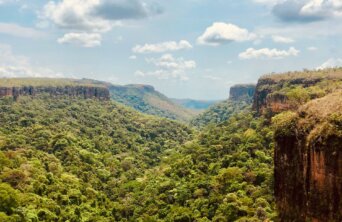- About
- Topics
- Picks
- Audio
- Story
- In-Depth
- Opinion
- News
- Donate
- Signup for our newsletterOur Editors' Best Picks.Send
Read, Debate: Engage.
| topic: | Indigenous people |
|---|---|
| located: | Brazil |
| editor: | Ellen Nemitz |
From 23 to 28 April, nearly 6,000 representatives from 180 indigenous ethnicities gathered in Brasília, the capital of Brazil, for the Free Land Camp march - one of the most prominent indigenous protests in the world.
This year, the protesters gathered around the slogan "The indigenous future is today: without demarcation there is no democracy,” demanding that their land be protected with land demarcations, that is, decrees officially granting territories to their original owners: indigenous peoples.
In the past four months after President Luiz Inácio Lula da Silva has taken office, the Brazilian government has taken several highly-celebrated measures to protect Indigenous groups, such as the creation of the Ministry of Indigenous Peoples and the naming of influential leaders to important related bureaus, as well as the revocation of some of the hazardous policies and bills inherited from past administration that could potentially threaten indigenous peoples' lives.
The Free Lamp Camp, however, was a turning point. Side by side, President Lula, Marina Silva, the Minister of the Environment, Cacique Raoni, the ultimate indigenous leader, and other public figures listened to the speech of Sonia Guajajara, Minister of the Indigenous Peoples.
Guajajara highlighted the importance of the aforementioned advances, but also stressed that there are many remaining challenges to be addressed within the next four years. Due to a widespread issue involving the occupation of indigenous lands to all sorts of economic ventures, mainly criminal logging, mining and even narcotrafficking, it is crucial to provide proper surveillance by security forces to these territories threatened by invaders.
In addition, the minister recalled the importance of creating a Truth Committee in order to pursue historic reparations due for past human rights violations, as well as protecting the ways-of-living of diverse communities that live under particular conditions, from isolated and uncontacted jungle areas to urban areas.
If Lula attended the last march as a candidate full of promises, in this edition he came with solutions. On 29 April, during the final plenary session, he signed several decrees officially demarcating six territories from northern to southern Brazil, which benefits almost 4000 people.
Lula also resumed the National Council on Indigenous Policy and established the Management Committee of the National Policy for Territorial and Environmental Management of Indigenous Lands, besides destinating an additional fund for Funai, the National Indigenous Foundation. "The fight for the demarcation of indigenous peoples is a fight for respect, rights and protection of our nature and country. We are moving forward," he said.
Read our coverage on Indigenous peoples: guardians of nature
Also, the indigenous leaders and attendees of ATL declared a climate emergency and emphasised the importance of indigenous knowledge in preventing the worst-case scenario. On Twitter, the federal deputy Celia Xakriaba explained that we, as a human kind, have only "five minutes left to save the planet." Therefore, now is the right time to act, she adds. "We have social and ancestral technologies to stop climate change," Xakriaba affirmed, on behalf of her fellows.
Image by Joao Tzanno

